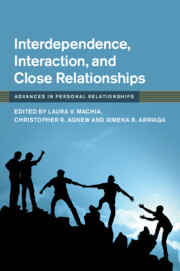'This is a comprehensive and timely overview of how interdependence theory has shaped relationship science. It is a must-read for anyone who likes to keep up to date about the latest on classic and completely new research topics in the study of relationships.'
Paul van Lange - Vrije Universiteit, Amsterdam
'In this volume, a veritable ‘who’s-who’ of relationship scholars provide important insights into one of the most foundational perspectives in relationship science: Interdependence Theory. Who better to cover this topic than those whose research we are ‘dependent’ on for understanding interdependence? This book should be on the shelf of any scholar interested in interaction.'
J. Kale Monk - University of Missouri
'More than sixty years after its original description, Interdependence Theory continues to thrive as an innovative and generative model for understanding social interaction and close relationships. The diverse and thought-provoking chapters in this superb volume testify to the theory's continued relevance for inspiring novel research and deeper insights into human social behavior.'
Harry Reis - Professor of Psychology and Dean's Professor in Arts, Sciences, and Engineering, University of Rochester, New York
'In 1959, Thibaut and Kelley introduced a formal theory of social dynamics. A generation later, this theory became the cornerstone of relationship science. Today, in this marvelous book, a brilliant team of scholars brings us up to speed on the very best research on Interdependence Theory. Join them for an inspiring tour!'
Eli J. Finkel - Northwestern University, Illinois, and author of The All-or-Nothing Marriage
'This volume is an excellent guide to the ways close relationships are structured, how individuals negotiate their interdependence, and the reasons why this perspective is crucial for understanding how relationships can flourish amid life’s vicissitudes. Researchers will pick up this book for pleasure and bond with it long-term.'
Alan J. Fridlund - University of California, Santa Barbara



